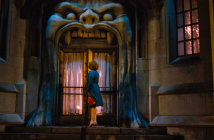
Kingsman: The Secret Service (2014)
Cast: Colin Firth, Taron Egerton, Samuel L. Jackson
Director: Matthew Vaughn
Country: UK
Genre: Action | Adventure | Comedy | Crime
Editor’s Notes: Kingsman: The Secret Service is currently out in wide release.
Matthew Vaughn (X-Men: First Class, Kick-Ass, Stardust, Cake) may never direct an entry in the official Bond canon (No. 23, Spectre, is currently in production under Sam Mendes’ guidance), but Kingsman: The Secret Service, an adaptation of Mark Millar (Nemesis, Civil War, Wanted) and Dave Gibbons’ (Watchmen) comic-book miniseries, will be as close as he gets (i.e., not close at all). As hyper-violent as Kick-Ass and as hyper-stylized as X-Men: First Class, Kingsman: The Secret Service retro-inspired, pop culture-inflected super-spy mash-up has its share of visual thrills – a given where Vaughn is concerned – but it also has its share of unwieldy tonal shifts, thematic contradictions, and subtextual incongruities – also typical of Vaughn’s oeuvre – to make Kingsman: The Secret Service a deeply problematic moviegoing experience.
As hyper-violent as Kick-Ass and as hyper-stylized as X-Men: First Class ….
Kingsman: The Secret Service ostensibly centers on Gary ‘Eggsy’ Unwin (Taron Egerton), a twenty-something, working-class screw-up. When he’s not baiting his mother’s gangster boyfriend and absconding with another, minor-league henchman’s kitted-out sports car, he’s doing jack-all (or less than jack-all). He’s essentially drifting through life, not so much looking for purpose as stumbling into it when a dapper, older gentleman in a bespoke, double-breasted, pin-striped suit, Harry Hart (Colin Firth), saves him from incarceration. Hart, a Kingsman of the title, belongs to a super-secret, privately-held spy organization. It’s free of government and bureaucratic entanglements, guided by Old World notions of long-gone English exceptionalism. The Kingsmen do the scut work – or rather the black ops work – that the British government’s spy agencies can’t and won’t do. Not surprisingly, they’re also highly trained assassins, capable, at least in Hart’s case, of taking out a roomful of generic thugs without breaking a sweat or wrinkling their suit jacket.
 Hart and Eggsy meet at a propitious, if not outright coincidental time. Eggsy needs to escape his working-class roots and the thugs who want him seriously injured or dead while Hart, codenamed Galahad, needs to find a suitable replacement for a recently fallen Kingsman. Along with a handpicked group of whiter-than-white, upper-crust Brits (including all of two women), Eggsy undergoes rigorous training and prep. Only one candidate can be become a Kingsman, sharpening the competition between Eggsy and with only one exception, Roxy (Sophie Cookson), and the others (Cue training montage). There’s little surprise or suspense about the winner of the super-secret spy organization sweepstakes (with one minor, easily foreseeable “twist” that ultimately goes nowhere), but Vaughn manages to perk up several scenes, if only because of the real-world threats they represent (e.g., drowning, skydiving).
Hart and Eggsy meet at a propitious, if not outright coincidental time. Eggsy needs to escape his working-class roots and the thugs who want him seriously injured or dead while Hart, codenamed Galahad, needs to find a suitable replacement for a recently fallen Kingsman. Along with a handpicked group of whiter-than-white, upper-crust Brits (including all of two women), Eggsy undergoes rigorous training and prep. Only one candidate can be become a Kingsman, sharpening the competition between Eggsy and with only one exception, Roxy (Sophie Cookson), and the others (Cue training montage). There’s little surprise or suspense about the winner of the super-secret spy organization sweepstakes (with one minor, easily foreseeable “twist” that ultimately goes nowhere), but Vaughn manages to perk up several scenes, if only because of the real-world threats they represent (e.g., drowning, skydiving).
Not surprisingly, Kingsman: The Secret Service’s flaws extend to its treatment or representation of non-white characters.
Eggsy’s rote training runs roughly in parallel with Hart’s investigation of Richmond Valentine (Samuel L. Jackson), a megalomaniacal tech billionaire with the most annoying lisp ever put on film (analog or digital) and a suitably evil plan concocted from watching too many Bond films, (specifically Roger Moore’s). Frustrated with the lack of progress on climate change and besotted with the power that only mega-wealth can bring, Valentine’s plan involves a virtual cleansing or purging of the human race using an idea shamelessly lifted not from a Bond film, but from one of Stephen King’s lesser horror novels, Cell (soon to be a major motion picture, of course). Constant references to extra-filmic pop-culture, specifically, but not limited to Bond and Bourne (and the conventions/tropes they represent) make for a few self-aware, knowing jokes or gags, but they’re really more than superficial reminders of infinitely more entertaining, engaging films.
Not surprisingly, Kingsman: The Secret Service’s flaws extend to its treatment or representation of non-white characters. The villain? African-American. The villain’s deadly henchwoman? Definitely non-British (she’s actually Algerian) while the heroes, down to a man and a single woman, belong to the Caucasian persuasion. Just as typically, the women in Kingsman: The Secret Service serve a purely ornamental function, albeit with one exception (Roxy), though she’s coded as a character afraid of heights/skydiving (Eggsy convinces her to overcome her fear) and gets pushed into a minor, supporting role during the climactic attack on the villains’ super-secret, mountainside lair. She’s relegated to literally floating in space while Eggsy goes into full-on heroic (or rather superheroic) mode, proving his relative worth as a staunch defender of the current world order (with all of its inequalities). In short, he becomes part of the system he once actively rebelled against, with a bullet proof, tailored suit as the symbol of his capitalistic worthiness. That too comes as little surprise since it’s part and parcel of the subtext underlying the Bond series and its innumerable imitators.
Kingsman: The Secret Service retro-inspired, pop culture-inflected super-spy mash-up has its share of visual thrills – a given where Vaughn is concerned – but it also has its share of unwieldy tonal shifts, thematic contradictions, and subtextual incongruities – also typical of Vaughn’s oeuvre – to make Kingsman: The Secret Service a deeply problematic moviegoing experience.



